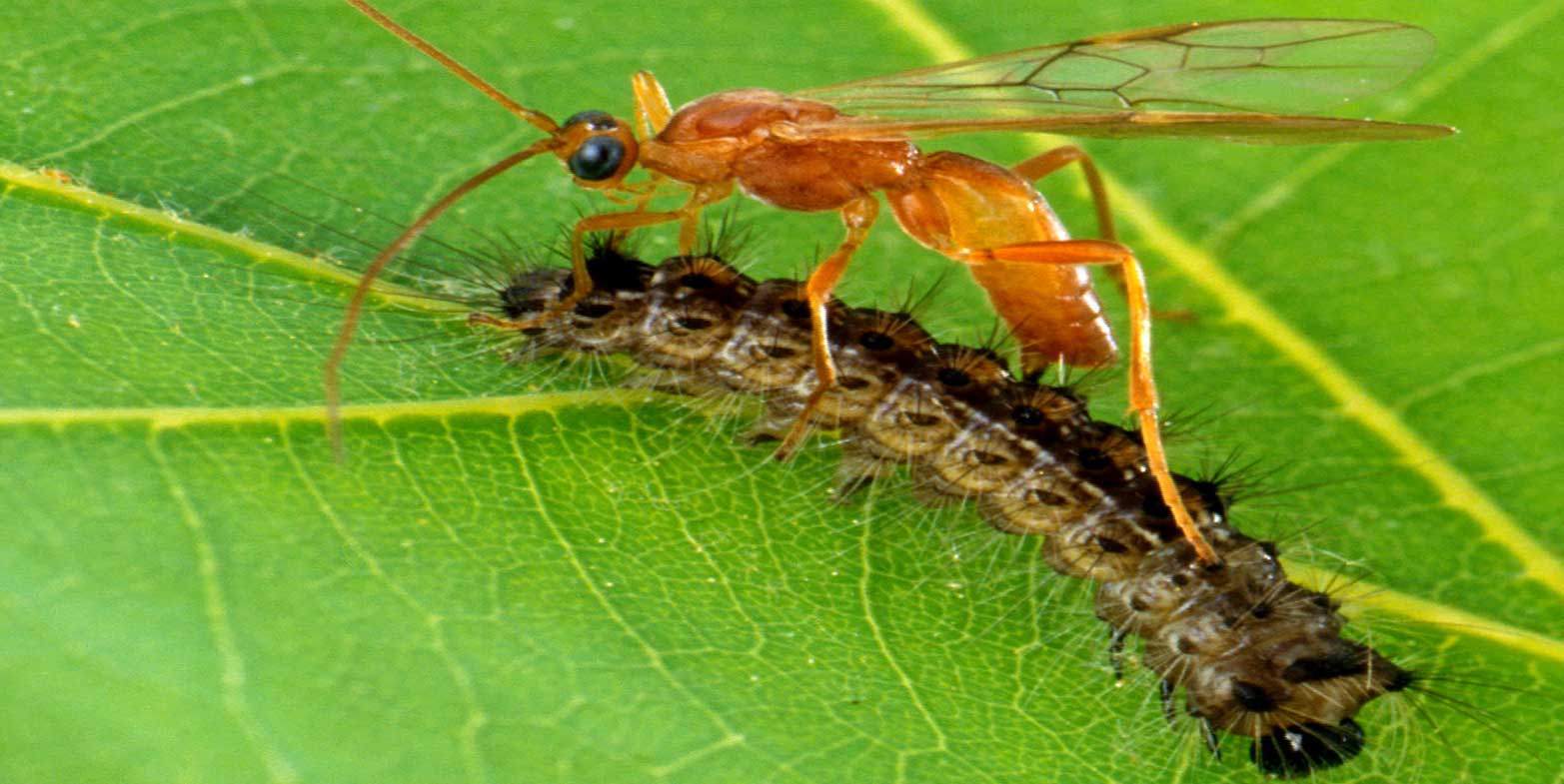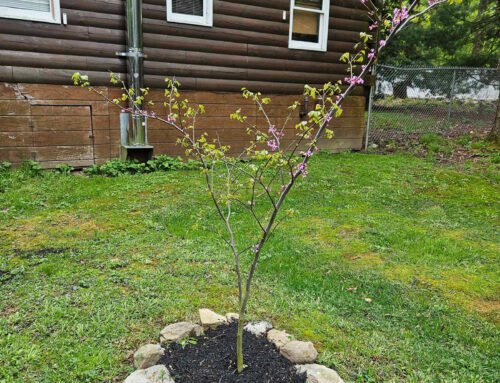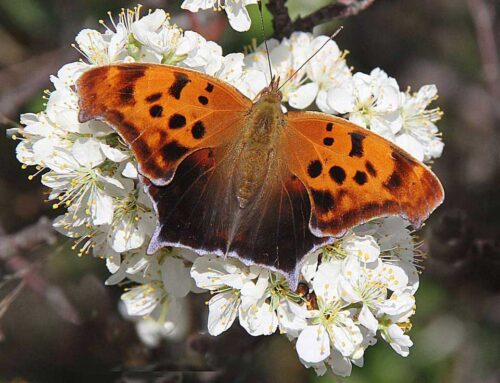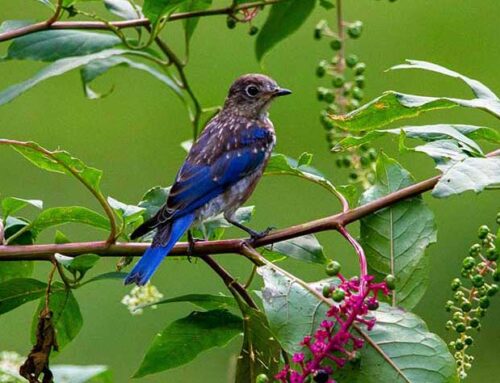Conservation Biological Control
Aleiodes-indiscretus-Wasp
“The balance of nature depends on the activities of parasites and predators, the majority of which are insects. Many insects, including caterpillar hunter beetles, pirate bugs, and praying mantises, keep populations of herbivorous insects in check. Equally important are parasitic insects, a prime example being braconid wasps.”
Eco-Systems for Beneficial Insects
With schools being closed due to the COVID19 pandemic and the future generation is stuck at home for the duration, this is an excellent opportunity to teach them about Conservation Biological Control. What is that you may ask? With the advent of chemical pesticides, the contributions of beneficial insects (those that prey upon or parasitize garden pests) were largely forgotten. However, pesticides alone have not solved the problem of pests—and of course, pesticides have been shown to have widespread, harmful impacts.
Conservation biological control (CBC) seeks to integrate beneficial insects back into ecological systems for natural pest control. This strategy is based upon ongoing research that now demonstrates a link between the conservation of natural habitat and reduced pest problems within the lawn and garden. Biological control is an ideal alternative to the use of chemicals and pesticides when implementing a pest management strategy, but its impact and level of use globally remain modest and inconsistent. It is defined as the reduction of pest populations by natural enemies and typically involves an active human role.
Natural enemies of insect pests, also known as biological control agents, include predators, parasitoids, and pathogens. At Lincoln Landscaping one of the practices that we strongly recommend is our “ninjas in the garden” project, an example of which shows the wonder and joy that our next generation can learn by practicing sustainable landscaping practices. In that video you will see lady bugs and praying mantis released into my garden. The adventure turned into a family celebration, as we watched them climb up each plant, looking for aphids, mites, caterpillars and such. These bugs of prey are referred to as Beneficial’s, and have names like assassin bugs.
Beneficial Insect Species Examples

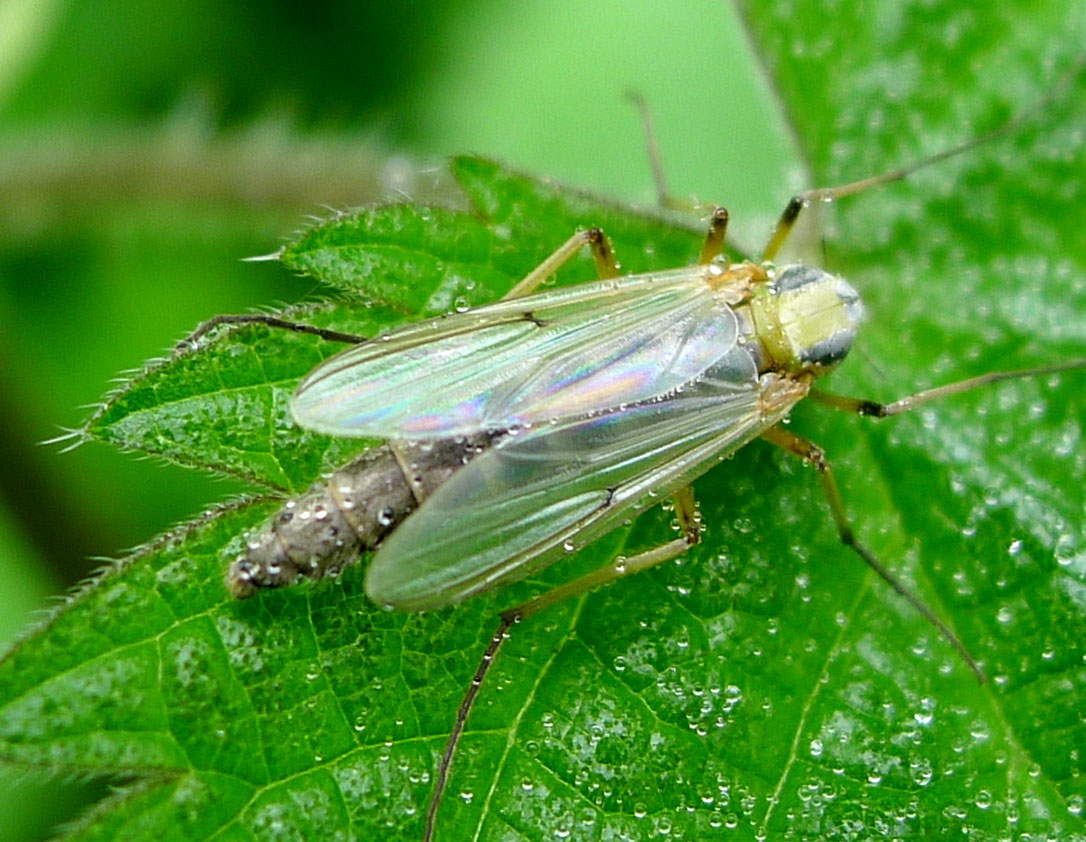 Aphid midges are one of the good garden bugs. Count these tiny, delicate flies among your allies in the battle against aphids. Aphid midges (Aphidoletes aphidimyza) are tiny flies with long, slender legs. They often stand with their antenna curled back over their head. Their larvae are bright orange and consume soft-bodied insect pests. Aphid midges consume about 60 different species of aphids, including those that attack vegetable crops, ornamentals and fruit trees. Voracious feeders, aphid midges can be more effective at managing an aphid infestation. The adult midge flits around your garden pollinating and looking rather fetching, but the real garden helper is in the larval stage. Aphid midge larvae are ferocious and voracious aphid killers. In fact, a single larva can consume up to sixty-five aphids in just one day. The larvae have strong jaws and a paralyzing toxin able capable of getting rid of the aphid population naturally. The larvae feed and kill the aphids by grasping them firmly and then they paralyze them by injecting toxin into their leg joints so they can’t run away. Their small size and homely appearance cause them to be overlooked, but they really are excellent garden helpers for insect pest control.
Aphid midges are one of the good garden bugs. Count these tiny, delicate flies among your allies in the battle against aphids. Aphid midges (Aphidoletes aphidimyza) are tiny flies with long, slender legs. They often stand with their antenna curled back over their head. Their larvae are bright orange and consume soft-bodied insect pests. Aphid midges consume about 60 different species of aphids, including those that attack vegetable crops, ornamentals and fruit trees. Voracious feeders, aphid midges can be more effective at managing an aphid infestation. The adult midge flits around your garden pollinating and looking rather fetching, but the real garden helper is in the larval stage. Aphid midge larvae are ferocious and voracious aphid killers. In fact, a single larva can consume up to sixty-five aphids in just one day. The larvae have strong jaws and a paralyzing toxin able capable of getting rid of the aphid population naturally. The larvae feed and kill the aphids by grasping them firmly and then they paralyze them by injecting toxin into their leg joints so they can’t run away. Their small size and homely appearance cause them to be overlooked, but they really are excellent garden helpers for insect pest control.

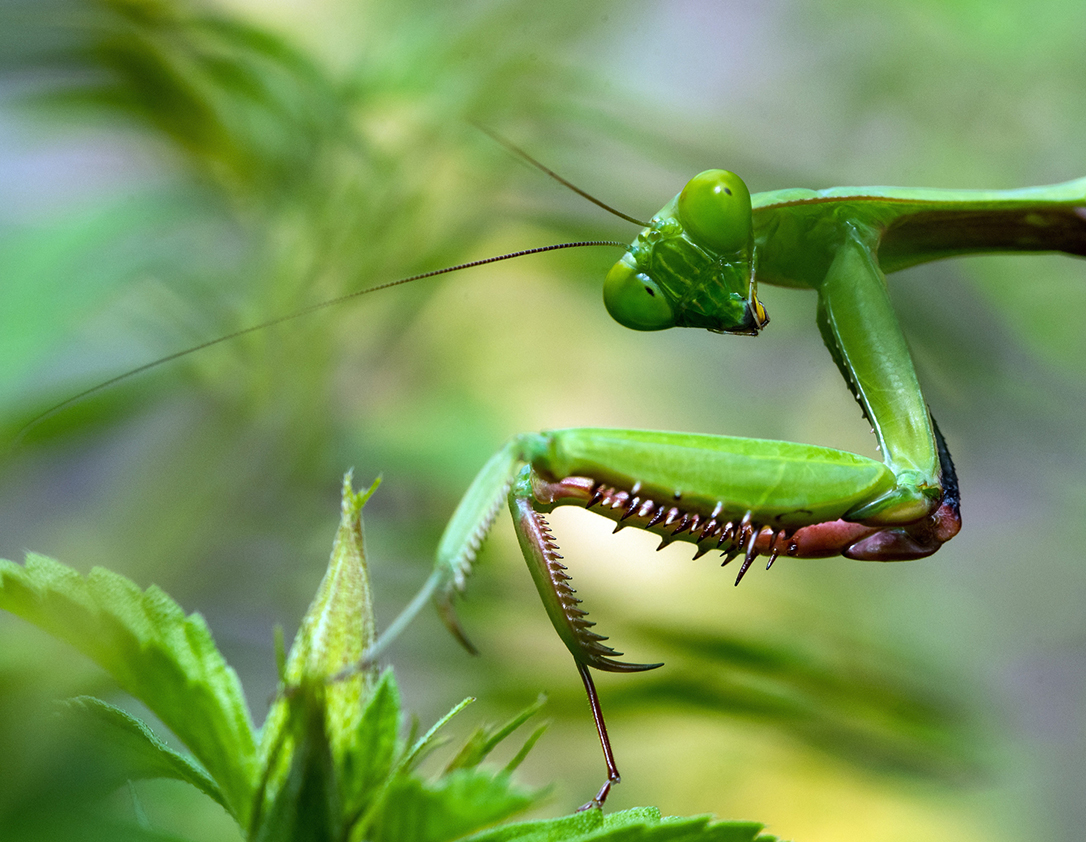 By any name, these fascinating insects are formidable predators. They have triangular heads poised on a long “neck,” or elongated thorax. Mantids can turn their heads 180 degrees to scan their surroundings with two large compound eyes and three other simple eyes located between them. Typically green or brown and well camouflaged on the plants among which they live, mantis lie in ambush or patiently stalk their quarry. They use their front legs to snare their prey with reflexes so quick that they are difficult to see with the naked eye. Their legs are further equipped with spikes for snaring prey and pinning it in place. Praying mantids are part of the hemimetabola group of insects; this means they do not undergo a complete metamorphosis. Praying mantis eggs are deposited in the form of an ootheca; this is a cluster of eggs enclosed by foam. This foam will quickly harder after the female has produced the ootheca, thereby protecting the eggs inside from cold, predators and from desiccation.
By any name, these fascinating insects are formidable predators. They have triangular heads poised on a long “neck,” or elongated thorax. Mantids can turn their heads 180 degrees to scan their surroundings with two large compound eyes and three other simple eyes located between them. Typically green or brown and well camouflaged on the plants among which they live, mantis lie in ambush or patiently stalk their quarry. They use their front legs to snare their prey with reflexes so quick that they are difficult to see with the naked eye. Their legs are further equipped with spikes for snaring prey and pinning it in place. Praying mantids are part of the hemimetabola group of insects; this means they do not undergo a complete metamorphosis. Praying mantis eggs are deposited in the form of an ootheca; this is a cluster of eggs enclosed by foam. This foam will quickly harder after the female has produced the ootheca, thereby protecting the eggs inside from cold, predators and from desiccation.

 Ladybugs are a very beneficial group. Worldwide, there are more than 5,000 species of ladybugs that can be orange, red, black, yellow or brown and with varying numbers of spots on their wing covers. The major advantage of ladybugs in the garden is to have a base population that can respond to harmful insects moving in. Ladybugs are predators of whiteflies, aphids, mites, mealybugs and scale insects, all pests with sucking mouth parts that feed on plants, stunting or killing the plants. Ladybugs can control pests without using insecticides. Ladybugs supplement their predatory diet with pollen and nectar, so adding plants with abundant nectar attracts ladybugs. U.S. Department of Agriculture scientists found that ladybugs were healthier and more numerous when they had nectar plus prey to eat. Ladybugs often seek nectar from glands located outside the flowers of plants that are native to their habitats, which is a good reason to practice sustainable landscaping with native plants.
Ladybugs are a very beneficial group. Worldwide, there are more than 5,000 species of ladybugs that can be orange, red, black, yellow or brown and with varying numbers of spots on their wing covers. The major advantage of ladybugs in the garden is to have a base population that can respond to harmful insects moving in. Ladybugs are predators of whiteflies, aphids, mites, mealybugs and scale insects, all pests with sucking mouth parts that feed on plants, stunting or killing the plants. Ladybugs can control pests without using insecticides. Ladybugs supplement their predatory diet with pollen and nectar, so adding plants with abundant nectar attracts ladybugs. U.S. Department of Agriculture scientists found that ladybugs were healthier and more numerous when they had nectar plus prey to eat. Ladybugs often seek nectar from glands located outside the flowers of plants that are native to their habitats, which is a good reason to practice sustainable landscaping with native plants.

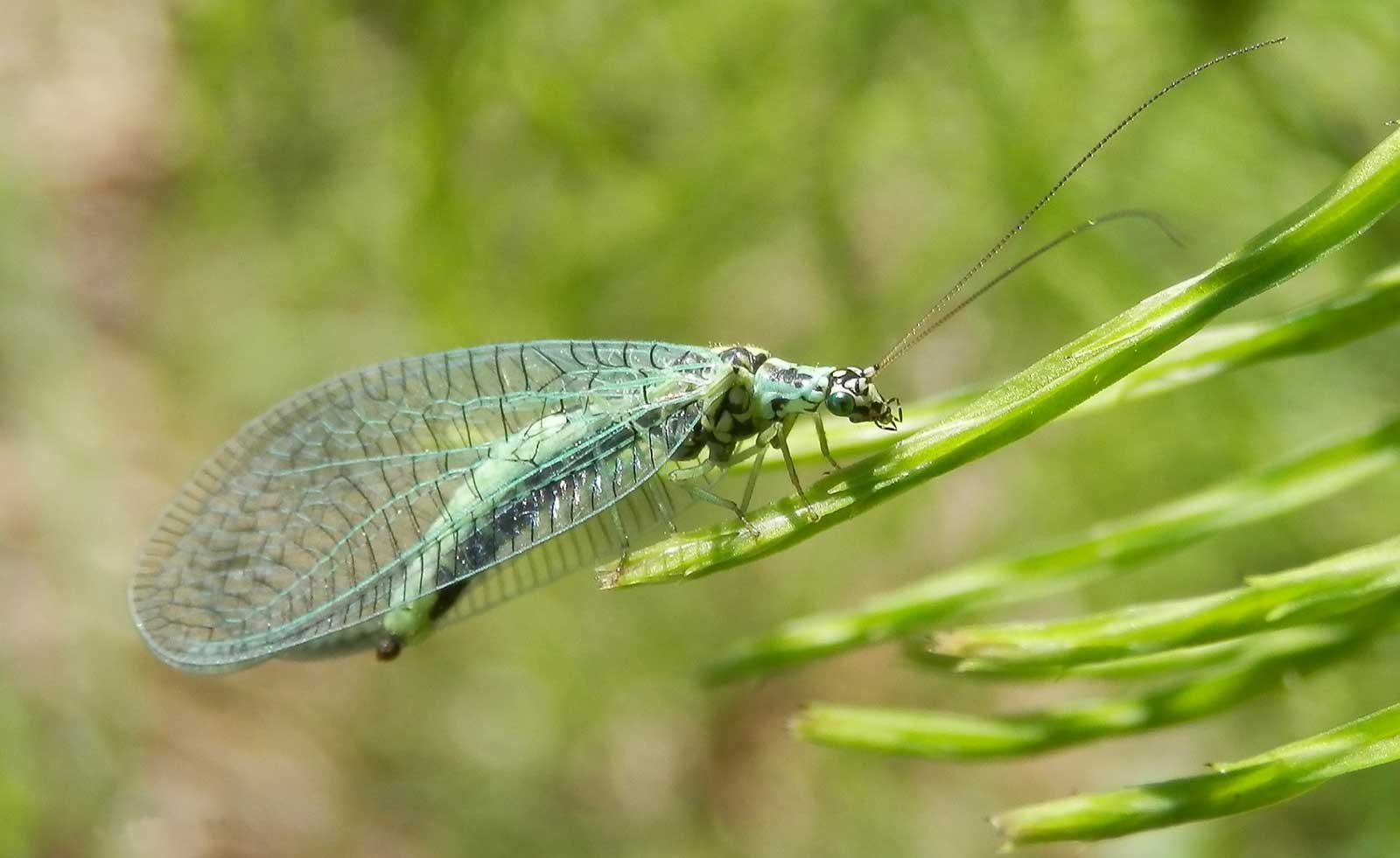 Chrysoperla Lacewings are beneficial in establishing a standing population for continued control of pests or for improved pollination. Lacewings Chrysoperla are one of our finest beneficial insects native to the Northeast, very likely the most voracious insect in your garden. Since lacewing larvae are the predatory stage, introduce adults early in the growing season prior to when garden pest control is needed. Each female adult lacewing lays around 200 eggs in a lifetime. Larvae feed on soft-bodied insects including Aphids, Mealybugs, Spider Mites, Leafhopper Nymphs, Caterpillar Eggs, Immature & Soft Scale, Thrips, and Whiteflies. Adult lacewings are very unique looking with their sweet lime green bodies, sparkling gold compound eyes and dramatic, sweeping wings like exquisite, translucent stained glass. Adult lacewings feed on nectar, pollen and the honeydew of aphids, like ants. Adult lacewings predominately eat nectar and pollen from flowers, so if you grow native perennial flowers, you are abundantly attracting adult lacewings. Adult lacewings overwinter as adults in leaf litter on the edges of gardens, meadows and forests. They’re widespread and common though inconspicuous, so they’re easy to miss. The adults will often disperse once they pupate, so providing abundant blooms throughout the season will entice them to stay, creating the next generation of ravenous larvae to keep your aphids in check.
Chrysoperla Lacewings are beneficial in establishing a standing population for continued control of pests or for improved pollination. Lacewings Chrysoperla are one of our finest beneficial insects native to the Northeast, very likely the most voracious insect in your garden. Since lacewing larvae are the predatory stage, introduce adults early in the growing season prior to when garden pest control is needed. Each female adult lacewing lays around 200 eggs in a lifetime. Larvae feed on soft-bodied insects including Aphids, Mealybugs, Spider Mites, Leafhopper Nymphs, Caterpillar Eggs, Immature & Soft Scale, Thrips, and Whiteflies. Adult lacewings are very unique looking with their sweet lime green bodies, sparkling gold compound eyes and dramatic, sweeping wings like exquisite, translucent stained glass. Adult lacewings feed on nectar, pollen and the honeydew of aphids, like ants. Adult lacewings predominately eat nectar and pollen from flowers, so if you grow native perennial flowers, you are abundantly attracting adult lacewings. Adult lacewings overwinter as adults in leaf litter on the edges of gardens, meadows and forests. They’re widespread and common though inconspicuous, so they’re easy to miss. The adults will often disperse once they pupate, so providing abundant blooms throughout the season will entice them to stay, creating the next generation of ravenous larvae to keep your aphids in check.

Braconid, (family Braconidae), any of more than 15,000 species of parasitic wasps (order Hymenoptera) that are dark or dull in colour and relatively small, seldom exceeding 1.5 cm (0.6 inch) in length. The wings are sometimes banded or spotted. The ovipositor, or egg-laying organ, of the female is long and conspicuous. 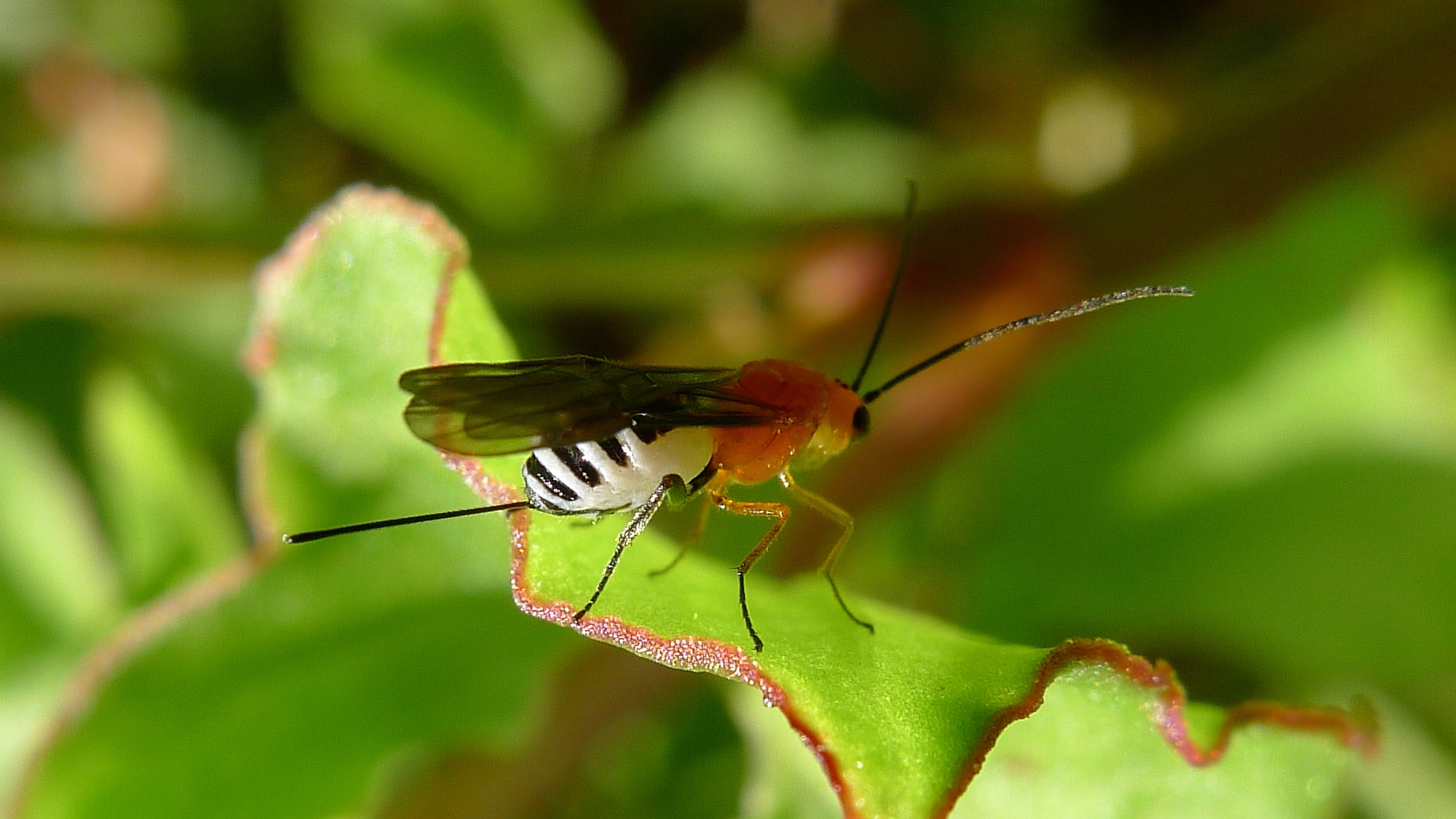 By increasing the braconid wasp population in your garden you can provide for natural control of caterpillars (including tomato hornworms), flies, leaf miners and aphids without the use of pesticides and chemicals. North America is home to nearly 2,000 species of these non-stinging wasps. Adult braconid wasps consumer flower nectar and pollen. They provide effective caterpilllar control, aphid control and more. Braconids lay eggs on numerous pest species, such as caterpillars (including cabbage worms and tomato hornworms), aphids, flies, beetle larvae, leaf miners and some true bugs. A female braconid wasp can lay from 50 to 200 eggs, so this beneficial can have significant positive effects in the garden. As the wasp larvae feed inside their hosts, they weaken them and make them incapable of reproducing. Try a planting of dill and fennel herbs because when allowed to flowers these herbs attract braconid wasps. Braconid wasps can be distinguished by the typical, narrowed “wasp-waist.” They may be shades of black, red, brown, or yellow, often with a dark spot at the edge of the forewing. The antennae have sixteen or more segments, and are shorter than the forewing. Although they may be slender or stout-bodied, the abdomen is always longer than the head and thorax combined. For most garden purposes, braconids can be recognized as the slender dark wasps commonly found hovering around aphid colonies or caterpillars. Virtually all tiny wasps found lingering in the vicinity of pests, regardless of family, are garden allies.
By increasing the braconid wasp population in your garden you can provide for natural control of caterpillars (including tomato hornworms), flies, leaf miners and aphids without the use of pesticides and chemicals. North America is home to nearly 2,000 species of these non-stinging wasps. Adult braconid wasps consumer flower nectar and pollen. They provide effective caterpilllar control, aphid control and more. Braconids lay eggs on numerous pest species, such as caterpillars (including cabbage worms and tomato hornworms), aphids, flies, beetle larvae, leaf miners and some true bugs. A female braconid wasp can lay from 50 to 200 eggs, so this beneficial can have significant positive effects in the garden. As the wasp larvae feed inside their hosts, they weaken them and make them incapable of reproducing. Try a planting of dill and fennel herbs because when allowed to flowers these herbs attract braconid wasps. Braconid wasps can be distinguished by the typical, narrowed “wasp-waist.” They may be shades of black, red, brown, or yellow, often with a dark spot at the edge of the forewing. The antennae have sixteen or more segments, and are shorter than the forewing. Although they may be slender or stout-bodied, the abdomen is always longer than the head and thorax combined. For most garden purposes, braconids can be recognized as the slender dark wasps commonly found hovering around aphid colonies or caterpillars. Virtually all tiny wasps found lingering in the vicinity of pests, regardless of family, are garden allies.
Implemention of native plant species is another form of augmentation. This tactic involves altering the environment to augment or enhance the effectiveness of a natural enemy by providing natural cover and growing habitats. Natural enemies can benefit from a source of nectar. Mixed plantings and the provision of flowering borders can increase the diversity of habitats and provide shelter and alternative food sources. They are easily incorporated into home gardens and even small-scale commercial plantings.
Examples of habitat manipulation include growing flowering plants (pollen and nectar sources) to attract and maintain populations of natural enemies. For example, Sedum Autumn Joy, a native plant, provides cover and shelter for praying mantis. Conservation Biological Control works hand in hand with Ecological Biological Control which focuses on preventive rather than reactive approaches to pest management. By increasing biodiversity and creating native habitat for natural enemies, creating these eco-systems at home can boost natural pest control services and reduce reliance on pesticides, therby saving the environment for future generations to come.
So where do you get these beneficial insects? You can start by calling Lincoln Landscaping 201-848-9699 today or email us or drop us a note on our contact page and we’ll supply you with quality and healthy beneficial insects, eggs and larvae.
Yua Tah Hey!
At Lincoln Landscaping cultivating the environment is our life and livelihood. It is our number one goal to help our clients create and maintain beautiful landscapes while reducing the impact on the environment. Whether you are interested in a pollinator landscape garden design and build or other landscaping or property management project; we can create for you an environmentally friendly, organic and beautiful property. Together with you, we create sustainable Eco-Systems.


